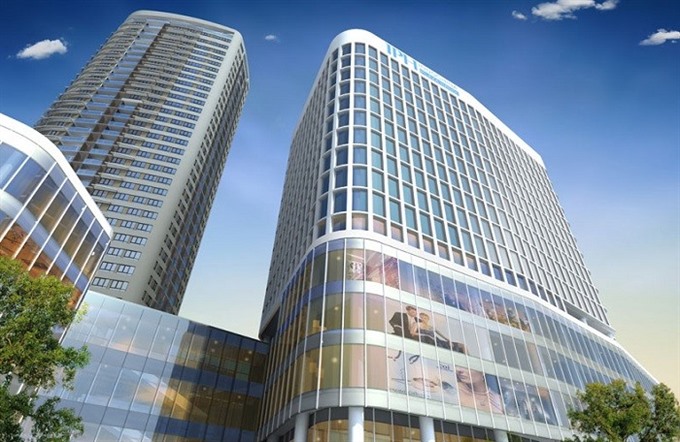Growth in the domestic office market has continued this year and is set to remain at record levels well into the future after more than 7 per cent growth in grade A rents last year, according to Savills Viet Nam.

Growth in the domestic office market has continued this year and is set to remain at record levels well into the future after more than 7 per cent growth in grade A rents last year, according to Savills Viet Nam.
Average occupancy rates in Ha Noi and HCM City were 92 per cent and 96 per cent, respectively, while the gross rent reached US$35.2/sq.m/month in Ha Noi and $48 in HCM City, according to Savills’ latest publication “Viet Nam Office Outlook 2018”.
The figures were relatively high compared with regional peers.
However, the enormous potential of this market was yet to be realised as the supply of office space in Viet Nam’s major cities was less than 20 per cent of that in Bangkok, Kuala Lumpur or Jakarta.
While supply was 1.6 million square metres each in HCM City and Ha Noi, Bangkok had 8.6 million square metres, Neil MacGregor, managing director of Savills Viet Nam, said at a seminar in HCM City last week.
“It is crucial for office occupiers to carefully analyse their needs, plan ahead and manage future occupancy costs effectively.”
Tu Thi Hong An, associate director of commercial leasing at Savills HCM City, said the Vietnamese market has the potential for sophisticated office projects following current global mega trends.
“The design, resources and functionality of offices will completely change in the coming years. If you consider all the numerous demand drivers and the requirements of today’s modern office occupiers, the opportunities are infinite.”
Yann Deschamps, head of Workthere, a Savills business that helps clients find flexible office space, said the upsurge of co-working spaces has set a new milestone in the office market.
“Co-working is not just about the sharing of infrastructure and costs, it is about belonging to a community. Spaces are designed to provide a productive and collaborative environment for dynamic inhabitants and created without corporate constraints on what is perceived to be an ‘office’ environment.”
The number of co-working spaces in Viet Nam rose by 62 per cent last year, driven by growth in start-ups and the need for cost-effective spaces, he added.
The first half of this year saw record occupancy of office space, strong tenant demand, limited new supply and rapidly growing rents, according to Savills.
Flexible space market
Viet Nam’s flexible space market is still at an early stage. The supply of flexible space in Viet Nam has soared since 2017 with many local operators opening their doors to occupiers, according to the Jones Lang LaSalle (JLL) Viet Nam Co Ltd’s press release on October 3.
Since 2018, the Viet Nam market has welcomed more foreign flexible space operators such as Kloud, CEO Suites, The Executive Centre and WeWork – which will open its first outlet in December 2018.
There is a divergence in space requirements between local and international operators. While local operators tend to locate their flexible space facilities in Grade B or lower grade office buildings, international operators often seek higher-grade buildings that match their product quality.
“Currently, demand for flexible spaces come mainly from start-up companies that prefer shorter and flexible lease terms as well as corporations looking for temporary spaces,” Stephen Wyatt, country head of JLL Viet Nam, said at the release.
“The start-up community in Viet Nam is growing fast, due to the positive economic outlook as well as increased funding from the private sector and government-led programmes. We expect these favourable market fundamentals to persist in the near term and expect the demand for flexible space to follow an upward trajectory in the future,” he said.
However, some co-working operators have found it challenging to retain tenants. Some short-term tenants tend to shift to newer spaces while some larger tenants upgrade towards medium- and long-term leases, said Wyatt.
Trang Bui, head of markets at JLL Viet Nam, said: “Demand has mainly come from technology companies who would like to expand their activities. These companies are believed to be the driving force for the market in future.”
Due to the high demand, rents have increased slightly, and projects likely to come into the market next year are already quoting higher than current average rates with the promise of good amenities.
Supply will be limited in 2019 but more grade B office buildings will hit the market a year later.
The limited supply of office space has created favourable conditions for other solutions like flexible space. - VNS





